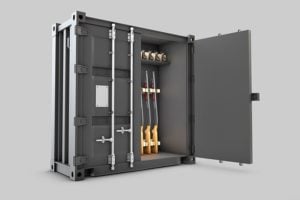Almost all military families can agree on one thing: PCS orders are a pain in the butt. Whether your kids are just learning to walk or already learning to drive, there’s never a “good” time to uproot your family and move clear across the country – but it’s a sacrifice military families make every year.
Thankfully, the PPM (Personally Procured Move or DITY Move) program is a convenient and affordable option for military families looking to make the move on their own terms. Interestingly enough, the cost of hiring a quality moving company for a cross-country PPM move is often similar to what you’d pay if you rented a truck and made the trip yourself. Of course, the challenge is to find a company ahead of time that not only fits your budget, but can also guarantee that your belongings will arrive on time.
Get a head start and learn how to ace your DITY Move by following the tips below.
1) Start early and know your budget:
As soon as you’ve received orders and are able to do so, head down to your Traffic Management Office (TMO) or Joint Personal Property Shipping Office (JPPSO) to receive your Personal Property Entitlement – it’ll determine how much you can budget for your move. Before receiving your entitlement, you’ll estimate of the weight of your household goods.
If you have the convenience of being able to plan ahead of time, you’ll have a better chance of securing a great deal from a cross-country moving company. Booking a moving company well in advance is especially important if you’re relocating during the busy summer season.
2) Compare moving services:
Once you have an idea of your moving budget, you can determine the kind of moving services you need. The level of service depends on the moving company:
- White glove moving services: Full-service or “white glove” moving companies will typically include inside pickup and delivery, along with any necessary packaging, protection, and re-assembly of your belongings in a quote. Find out what’s included in your quote.
- Hotshot and LTL/FTL transport: You can also solicit quotes from freight companies that offer pickup and delivery services at your home without “white glove” service. In the transport industry, LTL is Less-than-Truckload and FTL is Full Truckload. If you can package, protect and possibly palletize your belongings, you’ll often save over full-service moving services. Be sure to communicate with these companies about how to pack and prepare your household goods ahead of time.
- “Just Say No” to PODS: “Pod” transport services may be an option for long-term storage, but never for moving. Pod storage companies typically use “terminal-to-terminal” transport services that complete deliveries over the course of weeks rather than days. Only solicit quotes from them if you’re prepared to part with your belongings for several weeks.
3) Find company reviews online:
When asking for DITY moving quotes, always look for unedited reviews of moving companies online as well. The Better Business Bureau and uShip.com are two sites that can give you a clear idea of how moving companies have fared with customers in the past. Google search results also make it easy to tell if a company has a positive reputation. The moving industry is no stranger to fraud, so be sure to look online.
4) Confirm licensing and insurance:
If your mover will cross state lines, make sure they have operating authority and are registered with the DOT and FMCSA. The records are available online for free. You should also confirm that the mover has cargo insurance that covers the replacement value of your belongings.
5) Get everything in writing:
When booking a moving company, be proactive about asking moving companies about potential fees or unexpected labor costs. Quotes with different companies may be binding or non-binding depending on their policies. Companies that offer non-binding quotes may bill you for additional rates and fees at the end of your move.
You should also be on the lookout for the bill of lading or another complete, itemized and signed list of your belongings that should include the conditions and terms of payment for your move. You’ll also need this document to process any insurance claims. Both the carrier (moving company) and the shipper (you) should sign this document.




